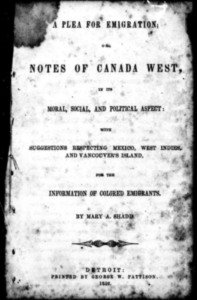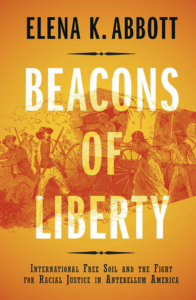On Tuesday, February 14, 2023, Emory will join the Colored Conventions Project in the national celebration of Frederick Douglass Day. The event brings together thousands of people from across the United States to sing Happy Birthday and work together to create new resources for the study of African American history. All members of the Emory community are invited to join the party!!
This year, Douglass Day will honor the work of Douglass’ fellow abolitionist and educator, Mary Ann Shadd Cary (1823-1893). Shadd Cary was born in Wilmington, Delaware on October 9, 1823. She resided there and in Philadelphia until 1851 when she emigrated to Ontario, Canada with her brother Isaac. She returned to the US during the Civil War, where she remained until her death.
Over the course of her lifetime, Shadd Cary was an avid community organizer and applied her many talents to educate and empower Black people. An activist, journalist, teacher, intellectual, and lawyer, she frequently commented on important national issues. In 1849, at just 25 years of age, she self-published Hints to the Colored People of the North. In 1852 she authored the book, “A Plea for Emigration, or, Notes of Canada West,” and the following year, she founded a newspaper entitled the Provincial Freeman. In 1863, she became the second Black woman to attend law school in the US, and in 1880, she founded the Colored Women’s Progressive Franchise Association.
A letter to Frederick Douglass, penned in 1849, exemplifies this spirit. “We should do more and talk less,” she wrote. Drawing upon her experience as a teacher, she lamented, “[w]e’ve been holding conventions for years–have been assembling together and whining over our difficulties and afflictions, passing resolutions on resolutions to any extent but it does really seem that we have made but little progress.” Douglass published her letter in the North Starand also began printing excerpts from Shadd Cary’s “Hints to the Colored People of the North.” As her biographer Jane Rhodes has noted, this “strong, audacious” voice made her both an “object of respect and leadership and as an object of derision.” This fearlessness in the face of controversy, she argues, is a central part of her story.
For more information on Shadd Cary’s life and impact, visit the Colored Conventions Project Douglass Day website. There you will find freely available articles and lectures.
In addition to these resources, you can research Shadd Cary’s life and other women like her via the Emory Libraries in the following ways:
“Beacons of Liberty: International Free Soil and the Fight for Racial Justice in Antebellum America” by Elena K. Abbot. Cambridge University Press, 2021.
“Mary Ann Shadd Cary: The Black Press and Protest in the Nineteenth Century” by Jane Rhodes. Indiana University Press, 1998.
“From Midnight to Dawn: The Last Tracks of the Underground Railroad” by Jacqueline Tobin, Doubleday, 2007.
Both print and e-books like these are available via Library Search. Useful search strings include: African American women educators history 19th century and African American women activists 19th century.
Read an Article
“‘Leave That Slavery-Cursed Republic’: Mary Ann Shadd Cary and Black Feminist Nationalism, 1852–1874,” by Nneka D. Dennie, Atlantic Studies 18, no. 4 (October 2, 2021): 478–93.
“Finding a Place: Mary Ann Shadd Cary and the Dilemmas of Black Migration to Canada, 1850-1870,” by Shirley J. Yee, “ Frontiers: A Journal of Women Studies 18, no. 3 (1997): 1–16.
 For more articles on Shadd Cary try searching multi-disciplinary databases such as JSTOR, Project Muse, or Academic Search Complete.
For more articles on Shadd Cary try searching multi-disciplinary databases such as JSTOR, Project Muse, or Academic Search Complete.
View Documents Created by Shadd Cary
Black Abolitionist Papers – Search the Black Abolitionist Papers database for issues of the Provincial Freeman alongside other letters and documents from Mary Ann Shadd Cary, her father, Abraham D. Shadd and her brother, Isaac D. Shadd.
Read additional copies of the Provincial Freeman via “Our Digital World” from the University of Windsor.
Ancestry.com – View Shadd Cary’s family tree, her grave, and documents related to her life.
Women and Social Movements – View documents related to Shadd Cary’s fight for women’s suffrage, including minutes from the Colored Women’s Progressive Franchise Association.
For more information about our Black history collections contact African American Studies and US History Librarian Erica Bruchko
Happy Birthday Frederick Douglass and Happy Black History Month from the Emory Libraries!

